Stuart Forster visits Studio Bell, the home of Canada’s National Music Centre, in Calgary, Alberta.
Disclosure: Stuart travelled as a guest of Air Transat and Canadian Affair. He was hosted by Visit Calgary and Travel Alberta. He thanks those organisations, and Destination Canada, for their support during the trip. This post has not been reviewed or approved.
“It’s good to see you’re expressing yourself through writing and photography. You were never going to make it as a musician,” commented my former band leader during a chance meeting ahead of my visit to Studio Bell, the home of Canada’s National Music Centre (NMC), in Calgary.
His words, spoken with a grin, flash into my mind as I pick up an electric guitar to take a brief tutorial on the basics of playing. Simple instructions are conveyed via a flat-screen monitor. Within minutes I’m strumming basic — very basic — chords.
The NMC is a creative space with a living collection. It’s not a traditional museum. That said, more than 2,000 instruments, musical artefacts and pieces of memorabilia form a collection spanning four-and-a-half centuries. The white piano played by Elton John while composing his first five albums is a star exhibit.
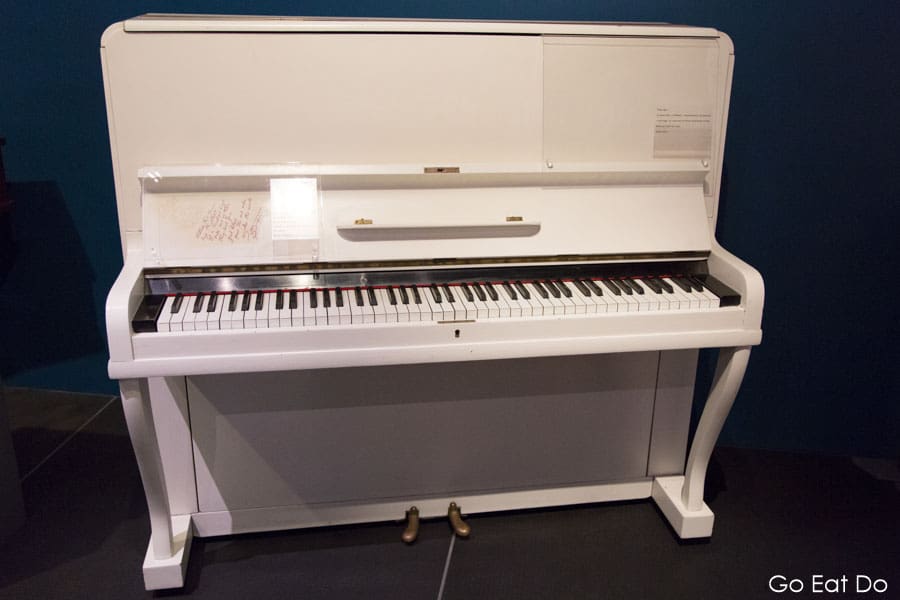
Part of Calgary’s East Village
Studio Bell has been a catalyst in bringing change to Calgary’s East Village. Formerly down-at-heel, the riverside district is being repositioned as one of the city’s up-and-coming areas. I checked into the Hilton Garden Inn and Homewood Suites Calgary Downtown for a week upon arriving in Calgary and can walk to attractions in the city centre.
Designed by Allied Works Architecture, a practice led by Brad Cloepfil, the building cost CAD$191 million. Remarkably, 1.2 million hours of labour went into the construction.
The façade and lobby are glazed with terracotta tiles serving the dual purpose of amplifying sound and reflecting light. Their earthy tones represent Alberta’s rural landscape.
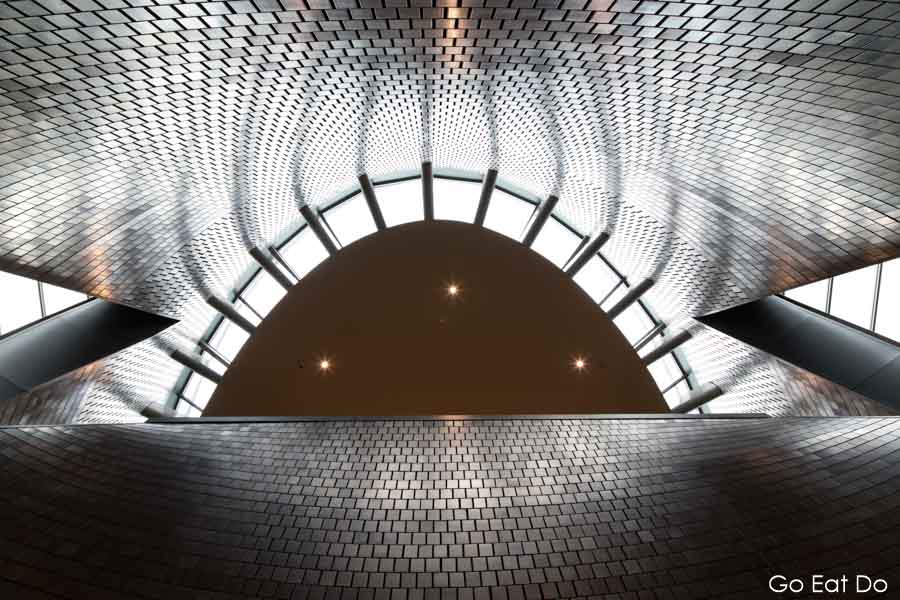
The long-lived King Eddy
A sword-shaped neon sign announces the Hotel King Edward on the corner of 9th Avenue SE. The King Eddy, long a popular blues venue, is now part of the NMC. It has been redeveloped into a studio for live shows.
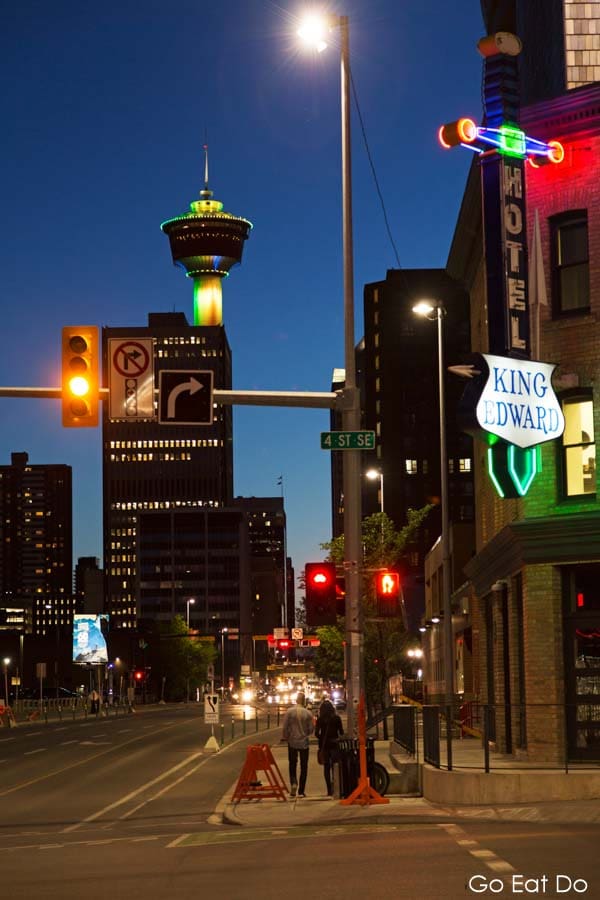
Jason Tawkin, the manager of collections access, is taking a break from a recording session with one of the NMC’s artists in residence. After explaining how musicians from across Canada visit to lay down tracks he shows me inside the van that’s still known as the Rolling Stones Mobile Recording Studio.
“This deck is where hits by the Rolling Stone, Led Zeppelin and Deep Purple’s Smoke on the Water were first played back,” utters Jason in a reverential tone. Like the recording studios upstairs, the equipment within the studio was state-of-the-art in its day.
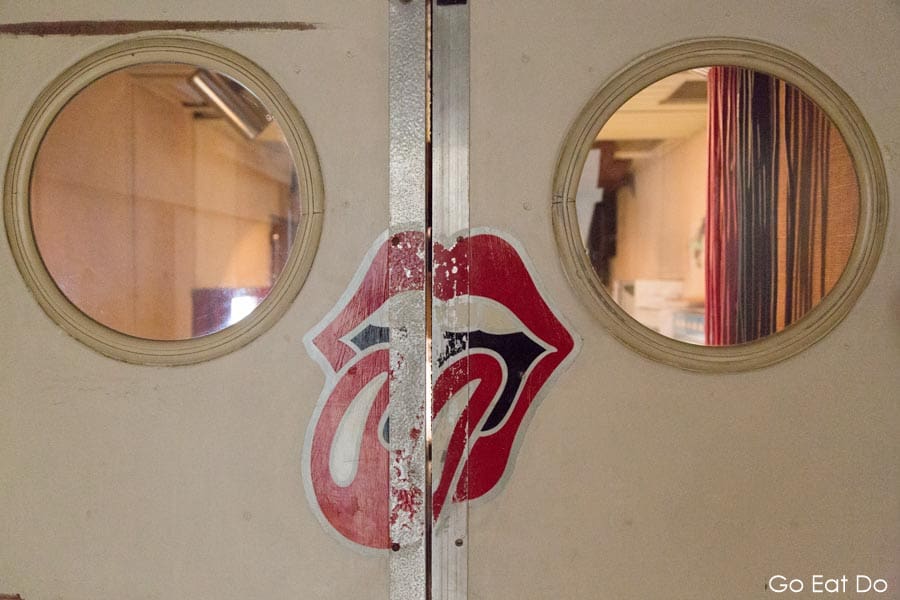
A modern recording studio
He shows where he’s spent his day so far, demonstrating how he controls sound levels. One way is by tweaking digital sliders.
Looking for rock stereotypes, I glance around the neat, subtly lit room. There are no empty bottles of Jack Daniels. Not even an ashtray, never mind evidence of chain smoking.
That’s just as well. The NMC is a hub for communal activities and plays a role in educational programmes. A group of local schoolkids jam together in a neighbouring room. Impressively, they aren’t fazed when I pop my head through the door.
I cross the walkway to the other wing of the attraction. Across five themed levels, the NMC’s exhibits are arranged in 22 galleries known as stages. They include the Canadian Music Hall of Fame, the Canadian Country Music Hall of Fame Collection and the Canadian Songwriters Hall of Fame.
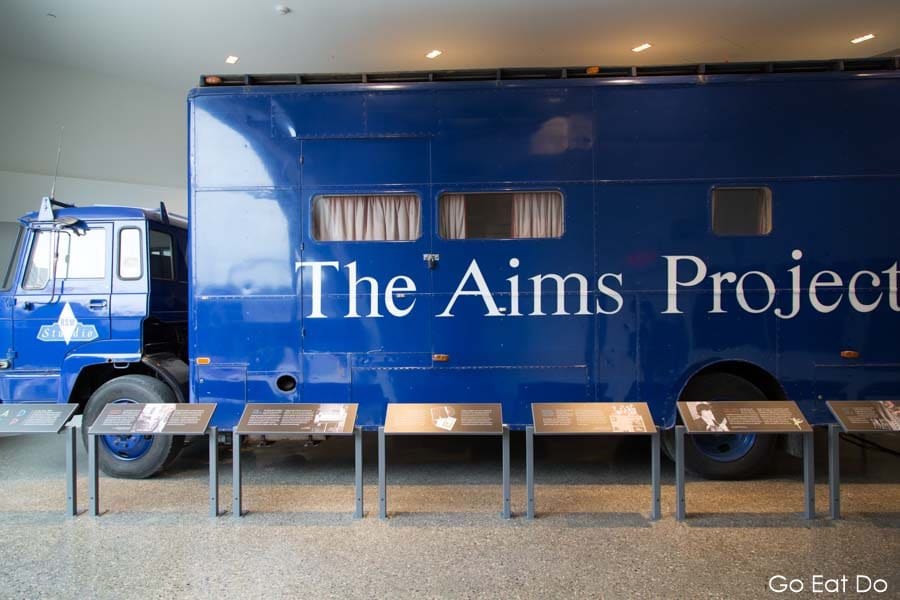
Bryan Adams and the who?
Inevitably, I recognise the names of Leonard Cohen and Bryan Adams — Canadians who are known around the world. But a handful of band names draw blanks when I go shopping for their tunes in my mental music store.
“What, you don’t know The Tragically Hip? You don’t know The Guess Who?” I’m asked incredulously by a Canadian. (To put my glaring lack of knowledge into context, it would be like a football fan visiting England without the foggiest idea about, say, Chelsea and Manchester City.)
An impressive electromechanical organ
Thankfully, I can flee the embarrassment by moving stages. Browsing quirkier exhibits, representing leaps in musical technology, enables me to satisfy the cravings of my inner nerd.
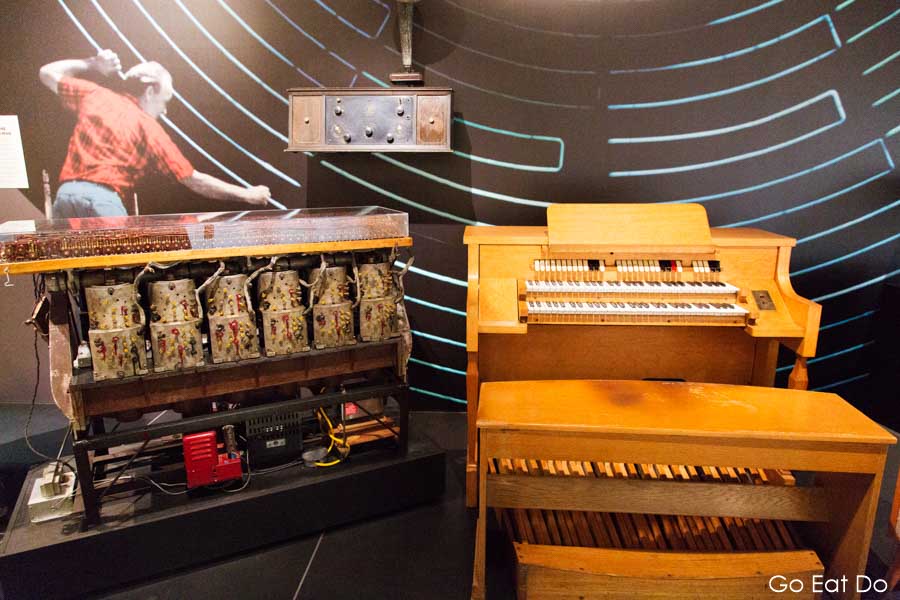
The NMC is home to the world’s only complete Rob Wave electromechanical organ. Dating from 1937, the instrument was at the forefront of electronic sound production — the first to go into commercial production. The depressed economic climate of the 1930s is regarded as a factor in why just 16 units were made.
TONTO — The Original New Timbral Orchestra — is currently undergoing restoration. The enormous analogue synthesiser was used on albums by Stevie Wonder and The Isley Brothers during the 1970s. Rather than having me press my nose up against his workshop’s glass panelling, John Leimseider, an NMC technician, invites me in for a better view.
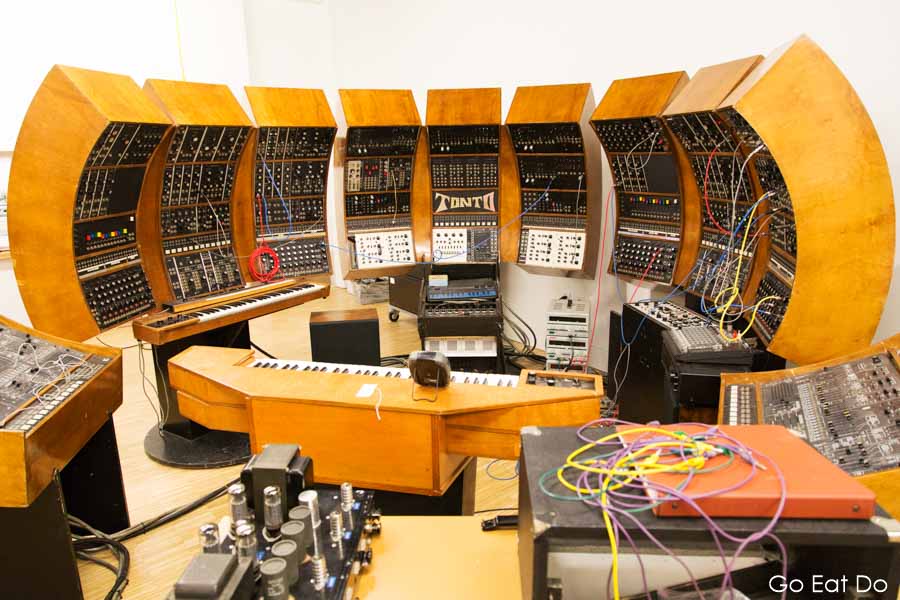
Restoring the Electronic Sackbut
He explains the challenges of sourcing parts and working on unique, innovative instruments. John is currently working on cloning the Electronic Sackbut, the world’s first voltage-controlled synthesiser. It was developed in 1945 by Hugh Le Caine, a Canadian physicist. To my untrained eye, it looks like a bunch of pegs and dials laid out on top of a wooden palette rather than a piece of music history.
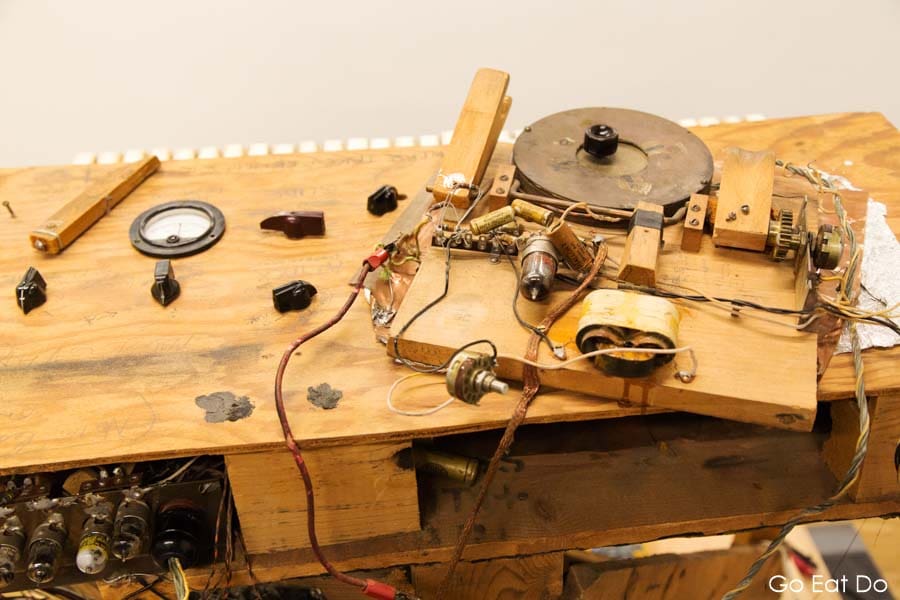
The tone of a Kimball Organ, an instrument once played to accompany silent movies, draws me to a crowd enjoying a demonstration. The woman playing explains the organ dates from 1924. Before being donated to the NMC it spent years stored in a basement.
She hammers out The Imperial March (Darth Vader’s Theme), from the film Star Wars. A kid grins upon recognising the melody. That beam of joy is one of the obvious benefits of maintaining musical instruments in good working order.
Perhaps, on returning home, I’ll oil my old trumpet’s valves and play a tune?
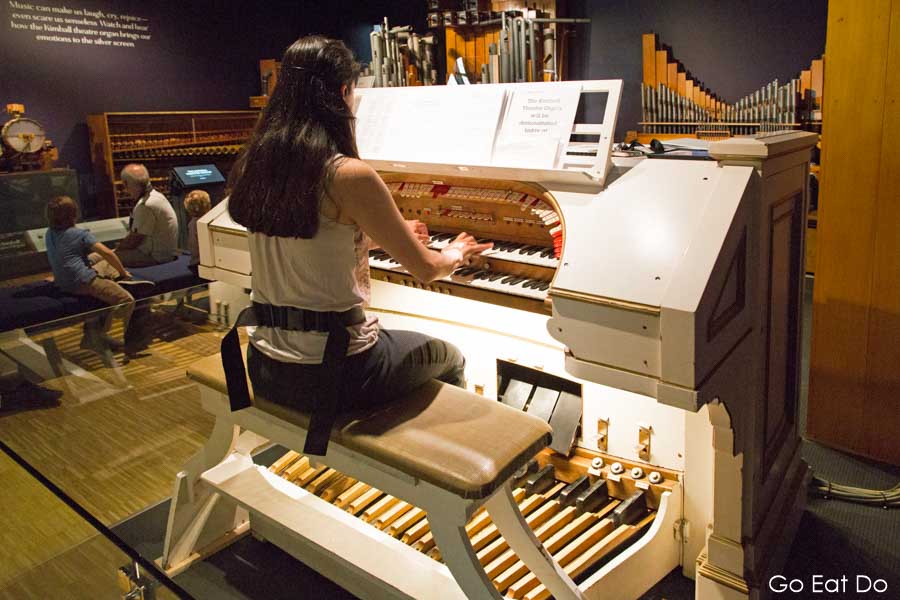
Best Wider World Tourism Award
There’s a positive post-script to this story. After returning home I entered Studio Bell, the home of the National Music Centre, into the British Guild of Travel Writers’ annual International Tourism Awards. The awards are open to tourism-related projects opened during the preceding three years.
Studio Bell was awarded a certificate of merit in the 2017 awards.
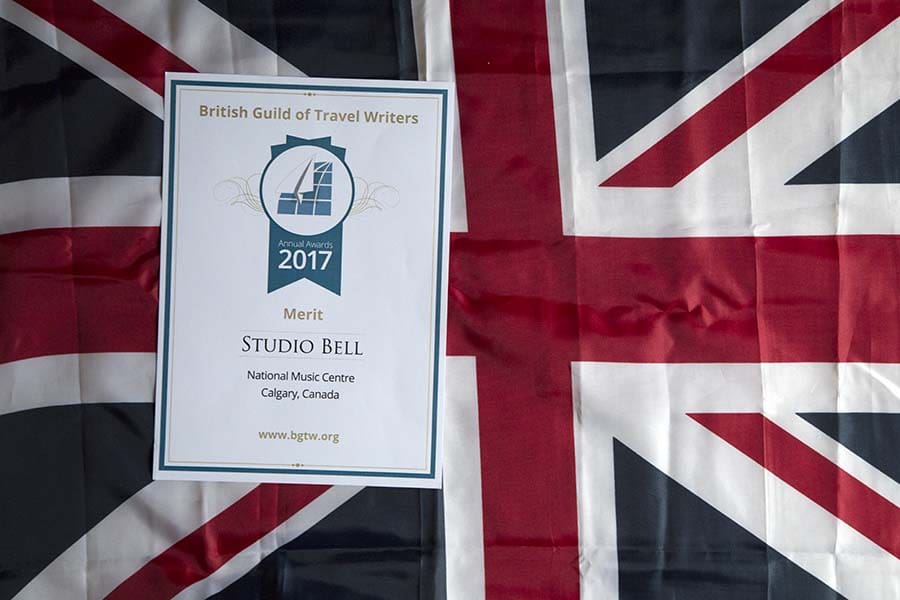
Travel to Calgary
Air Transat offers direct flights between London Gatwick and Calgary International Airport.
Air Transat’s Option Plus provides priority check-in, with a dedicated counter and a supplementary checked baggage allowance. It means seat selection, priority boarding and perks for onboard comfort. Those perks include a comfort kit of a blanket, sleeping mask and headphones for in-flight entertainment. Economy Class passengers can pre-order gourmet meals from the Chef’s Menu by Daniel Vézina (£15/€20).
Canadian Affair (tel. 0203 424 6316) has been arranging holidays in Canada since 1995. Like the idea of a break in Calgary? A Calgary and Banff Short Break includes seven nights of accommodation, including two in Calgary’s city centre.
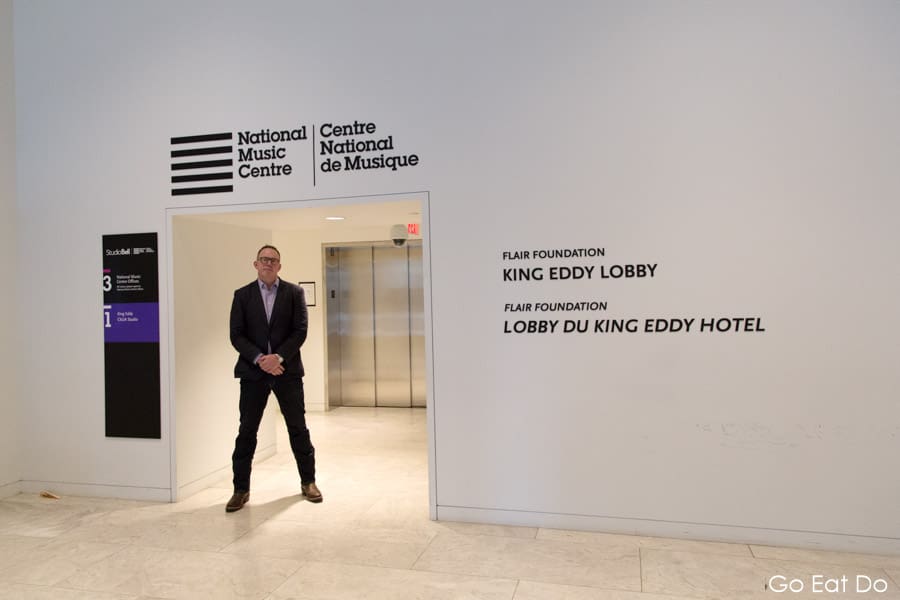
Further information
To check details about the collection, opening times and entry fees, see the Studio Bell: National Music Centre website. The attraction is at 850 4 Street SE, Calgary, TG2 1PG. The NMC also has a 300-seat auditorium and hosts temporary exhibitions.
For more ideas about things to do and see in Calgary, click on the Visit Calgary website.
The Travel Alberta and Explore Canada websites also have information about the city and the province of which it is part.
Photos illustrating this post are by Why Eye Photography.
If you enjoyed this post why not sign up for the free Go Eat Do newsletter? It’s a hassle-free way of getting links to posts on a monthly basis.
‘Like’ the Go Eat Do Facebook page to see more photos and content.



Lucy Dodsworth
October 27, 2017 at 11:59What a fascinating place! Great that the space is being used in so many different ways and it’s really part of the community as well as something for visitors. (By the way I had to Google The Tragically Hip after someone mentioned them to me when I was in Canada as I’d never heard of them either!).
Stuart Forster
October 29, 2017 at 12:10Thanks Lucy. For a while I thought it was just me that somehow hadn’t heard The Tragically Hip!
Becky Moore
October 27, 2017 at 20:57Looks like a great place to visit for music lovers, fascinating collection of artefacts they’ve got there!
Stuart Forster
October 29, 2017 at 12:11That’s right. I think that so many of them are still played enhances appreciation of the collection.
Kathryn @TravelWithKat
October 29, 2017 at 11:02What a fascinating place to explore! Brings back so many musical memories. A worthy nomination for the awards.
Stuart Forster
October 29, 2017 at 12:14Thanks, Kat. The enthusiasm and knowledge of the staff make it a joy to visit. I was impressed to see both amateur and professional musicians making use of the spaces within the building.
Heather Cowper
October 31, 2017 at 18:01Sounds like a mecca for music nerds and wannabes – I fear I would know even less of the household names than you, excepting the Rolling Stones of course.
Stuart Forster
November 6, 2017 at 18:26The great thing is it’s possible to listen to a lot of music while there, so it’s an opportunity for those of us who are not so good in pop quizzes to learn.
Eric Fox
February 17, 2018 at 22:35Cool idea! We’ll plan a visit during our fly-drive!
Stuart Forster
February 19, 2018 at 08:47Enjoy your visit!